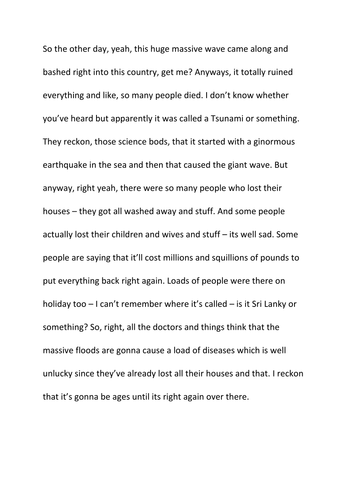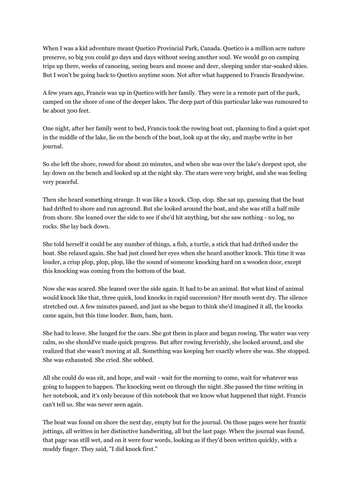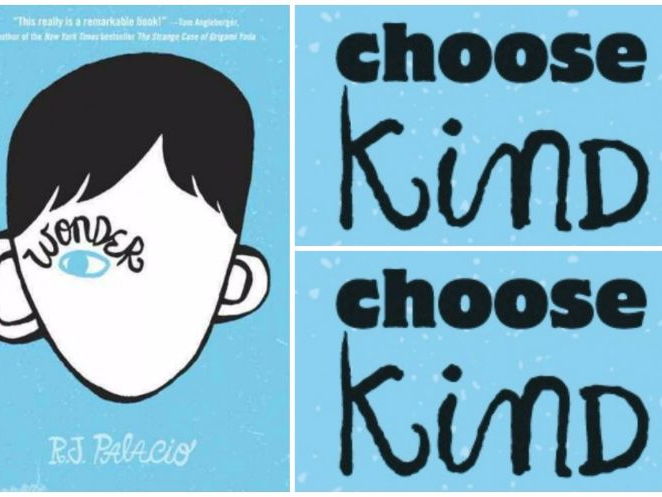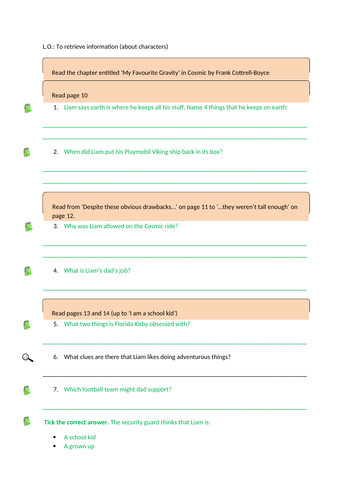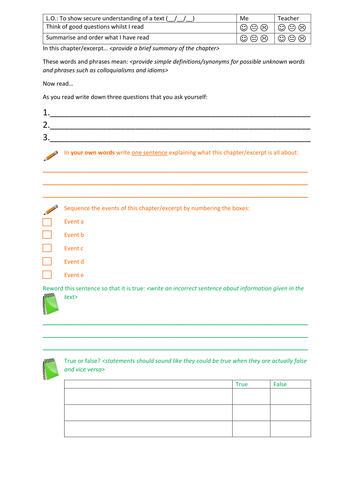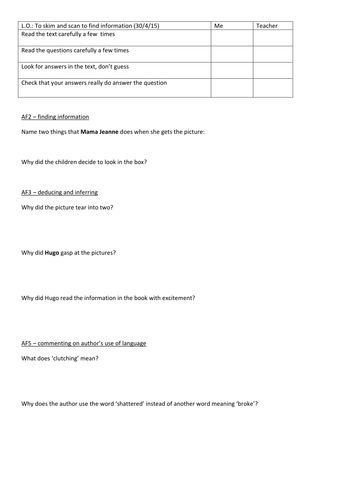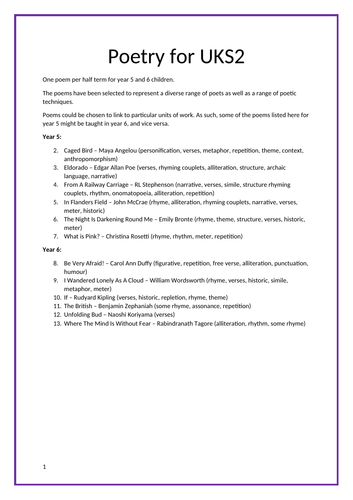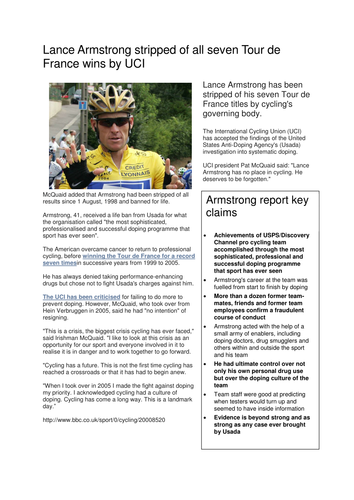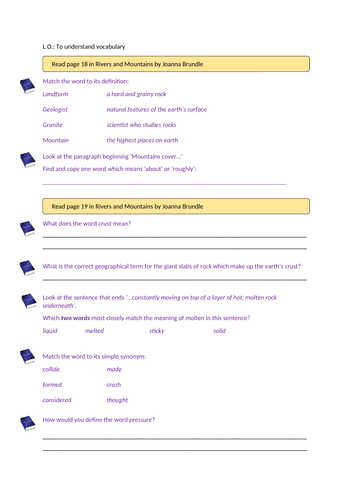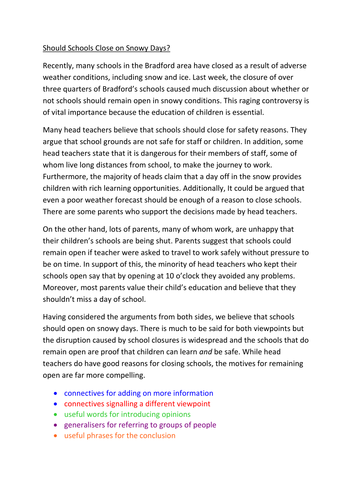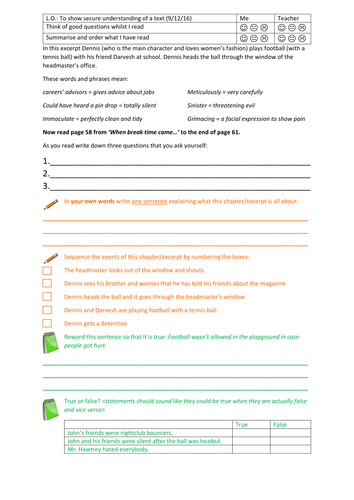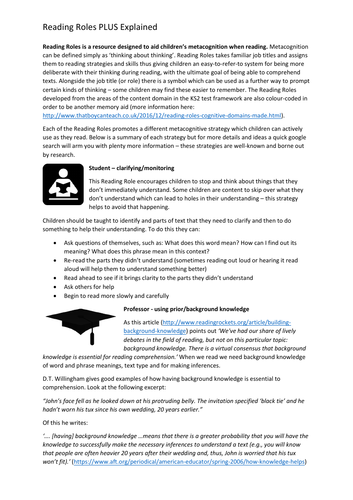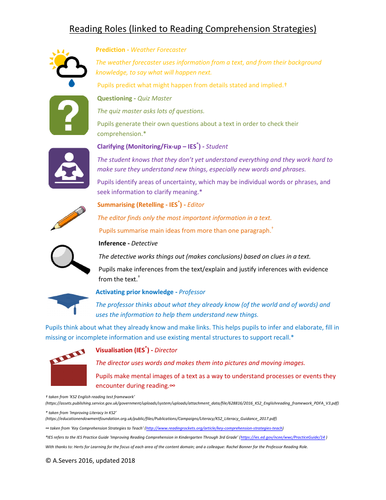
71Uploads
394k+Views
944k+Downloads
English

Fantasy Fiction resources
Including excerpts from:
The Hobbit
Harry Potter
The Lion, The Witch and the Wardrobe
Covering work on setting description, building tension, using verbs, figurative language.

Questions for 1st section of Wonder by RJ Palacio
Many of these questions have been written using this technique: http://thatboycanteach.blogspot.co.uk/2016/10/scaffolding-inference-trialling.html and some of them draw on ideas from Rhoda Wilson: https://misswilsonsays.wordpress.com/2016/10/02/moving-beyond-reading-comprehension-sheets/

Formal and Informal Writing
A couple of texts - one a news report about a Tsunami written informally to be converted into formal language, the other a formal letter (not a complaint, or persuasive) outlining views on a fictional matter.

Francis transcript and shorter transcript
To be used with Richard Hickey's 'Francis' short film.
http://www.literacyshed.com/the-ghostly-shed.html
https://vimeo.com/84786815
The original script is written by novelist & screenwriter Dave Eggers and the original transcript was taken from http://www.thisamericanlife.org/radio-archives/episode/448/transcript
I rewrote the transcript to make it shorter so that it could be used as a Talk 4 Writing text.

Questions for Wonder by RJ Palacio (Via's section)
These questions are colour-coded and linked to symbols from my Reading Roles and some follow my scaffolding inference technique:
http://thatboycanteach.blogspot.co.uk/2016/10/scaffolding-inference-trialling.html

Cosmic by Frank Cottrell-Boyce Reading Comprehension
Reading comprehension questions for various chapters of Cosmic by Frank Cottrell-Boyce.
Focussing on character description, retrieval, vocabulary and inference.

Reading Roles - a way to help children remember the areas of the content domain (KS1 and KS2)
Each of the new cognitive domains for reading has been linked to a well-known career/job/role in order to make each of the areas of the content domain easier to remember for both children and teachers.
Each area has a symbol and is colour-coded so that there are further ways for the children to remember the areas and what they mean.
These could be used to colour-code questions used in class - the symbols could also be assigned to question types so children begin to identify question types.

Hitler's Canary Supporting Non-Fiction Texts
A range of non-fiction resources to support understanding of key themes and events in Hitler's Canary by Sandi Toksvig.
The sets of questions named by the book's chapters are based on the book and not non-fiction texts.

EAL reading comprehension activity structure
http://thatboycanteach.blogspot.co.uk/2016/12/structuring-reading-comprehension-for.html

The Invention of Hugo Cabret Lesson Resources
Included in this set of resources are summarised versions of the different parts of the story. These were created so that the children had something of a more realistic length to base their own story writing on. If you have the book you could create PowerPoint presentations combining the text and the images (for copyright reasons I have not included my versions of these).
Also included are 'box up' frames (Talk For Writing) and comprehension questions.

UKS2 Poetry Booklet
One poem per half term for year 5 and 6 children.
The poems have been selected to represent a diverse range of poets as well as a range of poetic techniques.
Poems could be chosen to link to particular units of work. As such, some of the poems listed here for year 5 might be taught in year 6, and vice versa.
Year 5:
Caged Bird – Maya Angelou (personification, verses, metaphor, repetition, theme, context, anthropomorphism)
Eldorado – Edgar Allan Poe (verses, rhyming couplets, alliteration, structure, archaic language, narrative)
From A Railway Carriage – RL Stephenson (narrative, verses, simile, structure rhyming couplets, rhythm, onomatopoeia, alliteration, repetition)
In Flanders Field – John McCrae (rhyme, alliteration, rhyming couplets, narrative, verses, meter, historic)
The Night Is Darkening Round Me – Emily Bronte (rhyme, theme, structure, verses, historic, meter)
What is Pink? – Christina Rosetti (rhyme, rhythm, meter, repetition)
Year 6:
Be Very Afraid! – Carol Ann Duffy (figurative, repetition, free verse, alliteration, punctuation, humour)
I Wandered Lonely As A Cloud – William Wordsworth (rhyme, verses, historic, simile, metaphor, meter)
If – Rudyard Kipling (verses, historic, repletion, rhyme, theme)
The British – Benjamin Zephaniah (some rhyme, assonance, repetition)
Unfolding Bud – Naoshi Koriyama (verses)
Where The Mind Is Without Fear – Rabindranath Tagore (alliteration, rhythm, some rhyme)

Tour De France-Themed Maths Investigation
Differentiated 3 ways.
encourages application of mathematical facts and strategies.
Build-a-bike from a choice of parts using a budget (costs left blank so can be differentiated for groups).
Literacy - write an explanation for why they have chosen the parts.
Includes percentages and averages and inference/AF3 work for Literacy/reading.
One of the maths resources can be found in this document under Maths B46:
http://cycle.yorkshire.com/documents/tdf/legacy/EducationPacks/TDF-EducationResourcePack-SectionB.pdf

PowerPoint to Introduce SPAG/GPS SATs Test
PowerPoint to introduce SPAG/GPS SATs Test on Tuesday 10th May 2016 - run down of the question types.

Mountains Reading Comprehension Activities
Linked to Reading Roles (https://www.tes.com/teaching-resource/reading-roles-a-way-to-help-children-remember-the-areas-of-the-content-domain-ks1-and-ks2-11416334)
Based on the following books/poems:
Habitat Survival: Mountains by Melanie Waldron
Everest by Sangma Francis
Rivers and Mountains by Joanna Brundle
Asha and the Spirit Bird by Jasbinder Bilan
Unfolding Bud by Naoshi Koriyama

Should Schools Close on Snowy Days? Discussion Text Example
A WAGOLL resource (based on a Talk For Writing piece) for a discussion text. Two different structures are provided.

The Boy in the Dress Reading Activity
A reading resource for a David Walliams excerpt made using an EAL reading comprehension structure: http://thatboycanteach.blogspot.co.uk/2016/12/structuring-reading-comprehension-for.html
With its colour-coding and symbols it also links to my Reading Roles: http://thatboycanteach.blogspot.co.uk/2016/12/reading-roles-cognitive-domains-made.html - a way of making the cognitive domains memorable for staff and children.

Scaffolding Inference - a technique to help children to infer meaning from texts
Condensed from http://thatboycanteach.blogspot.co.uk/2016/10/scaffolding-inference-trialling.html
This is an explanation of on easy questioning technique to build children's understanding of what they are reading, focusing particularly on inference and how inference can be supported by vocabulary knowledge and information retrieval skills.
The symbols/colours are linked to: https://www.tes.com/teaching-resource/reading-roles-a-way-to-help-children-remember-the-cognitive-domains-ks1-and-ks2-11416334

Mo Farah’s full statement on Trump ‘Muslim ban’ - Reading Comprehension
A quick reading comprehension in response to Donald Trump's 'Muslim Ban' in the US centred around Mo Farah's initial statement outlining his concerns about not being allowed back to the US.
This reading comprehension has colour-coded questions using my 'Reading Roles' which are based on the content domain areas for reading (download them here: https://www.tes.com/teaching-resource/-11416334).

Reading Roles PLUS: Teaching Metacognitive Reading Comprehension Strategies
Reading Roles PLUS is a resource designed to aid children’s metacognition when reading. Metacognition can be defined simply as ‘thinking about thinking’. Reading Roles PLUS takes familiar job titles and assigns them to reading strategies and skills thus giving children an easy-to-refer-to system for being more deliberate with their thinking during reading, with the ultimate goal of being able to comprehend texts. Alongside the job title (or role) there is a symbol which can be used as a further way to prompt certain kinds of thinking – some children may find these easier to remember.
Read more: www.thatboycanteach.co.uk/2018/04/reading-roles-metacognitive-reading-strategies.html

Reading Roles linked to Reading Comprehension Strategies
A slimmed down version of Reading Roles PLUS which focuses only on reading comprehension strategies.



